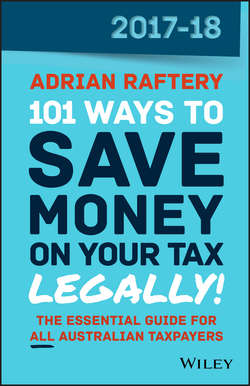Читать книгу 101 Ways to Save Money on Your Tax – Legally! 2017-2018 - Adrian Raftery - Страница 7
На сайте Литреса книга снята с продажи.
PART I YOU AND YOUR FAMILY 1 MARRIAGE
ОглавлениеAccountants are frequently asked two questions by couples who are just about to get married: ‘Are there any tax implications once we tie the knot?' and ‘Do we need to start doing joint tax returns?'
Your wedding day is a special day. So I'm perplexed as to why on earth the bride and groom are thinking about the ATO during such an exciting time in their lives!
You don't need to worry about tax in the lead-up to your nuptials. Unless you are involved in a business together, you don't have to lodge a combined tax return. Any share of joint investments, such as interest, dividends and rental properties, is still recorded separately in your respective tax returns.
TIP
You don't have to lodge a combined tax return if you're married. Any joint income is recorded separately in your respective tax returns.
You do need to show on your return that you now have a spouse, and disclose his or her taxable income each year.
PITFALL
The combined income of married couples is taken into account if you don't have private health insurance (an extra 1 per cent Medicare levy is charged if you earn over $180 000 combined, increasing to 1.5 per cent for couples earning more than $280 000) as well as when calculating Family Assistance Office benefits such as child care rebates and family tax benefits.
If you elect to change your name, you can notify the tax office:
•by phone on 13 28 61
•by post after completing the Change of details of individuals form (NAT 2817)
•or online via your MyGov account at www.my.gov.au. Make sure it is linked to the ATO.
You will need either your Australian full birth certificate; your Australian marriage certificate; or your Australian change of name certificate.
According to the ATO, the definition of spouse has been extended so that both de facto relationships and registered relationships are now recognised. Your ‘spouse' is another person (whether of the same sex or opposite sex) who:
•is in a relationship with you and is registered under a prescribed state or territory law
•although not legally married to you, lives with you on a genuine domestic basis in a relationship as a couple.
TAX FACT
Since 1 July 2009, people living in same-sex relationships have been treated in the same way as heterosexual couples for tax purposes. The ATO has outlined some of the tax concessions now open to same-sex couples, including:
•Medicare levy reduction or exemption
•Medicare levy surcharge
•net medical expenses tax offset
•dependant (invalid and carer) tax offset
•senior and pensioner tax offset
•spouse super contributions tax offset
•main residence exemption for capital gains tax.
It is not unusual to find a couple where each owns a main residence that was acquired before they met. However, spouses are only entitled to one main residence exemption for capital gains tax (CGT) purposes between them. If both members of a couple own a main residence they must do either of the following:
•select one residence for the exemption
•apportion the CGT exemption between the two residences.
Provided the homes meet the requirements for the main residence exemption, they will both be wholly exempt from CGT for the period prior to the couple being treated as spouses. However, from the time the couple became spouses, only one exemption is available, though this may be divided between the two dwellings.
EXAMPLE
Mary bought a house in 1992. She lived in it right up to the day she married Matthew in 2006 and moved into his house, which he had purchased in 2000. As they elected to treat Matthew's house as their main residence, Mary will be subject to CGT on her house from 2006. She will not be liable for CGT on any capital growth in the 14 years prior to becoming Matthew's spouse.
